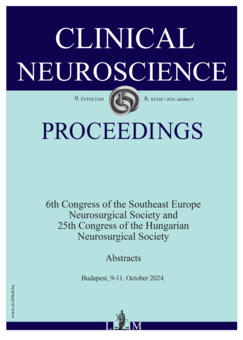Increased utility of telemedicine in neurosurgery - The COVID-19 effect
ALEN Rončević1, NENAD Koruga1
2024. OKTÓBER 09.
Ideggyógyászati Szemle Proceedings - 2024;9(6)
ALEN Rončević1, NENAD Koruga1
2024. OKTÓBER 09.
Ideggyógyászati Szemle Proceedings - 2024;9(6)
Szöveg nagyítása:

Telemedicine is defined as an application of digital communication tools in order to improve diagnostic and therapeutic options for patients without unneccessary visits. Prior to the COVID-19 pandemic, the implementation of telehealth in neurosurgery was gradual. However, with the start of the pandemic, there was a significant increase in the need for these digital tools in routine neurosurgical practice. In our study, we first compared the utilizitation of telemedicine in the year prior to the COVID-19 pandemic (between 11 March 2019 and 9 March 2020) with the year when the pandemic was officially declared in Croatia (between 11 March 2020 and 10 March 2021). Afterwards, we assessed the trend of telemedicine application in the following years of the post-pandemic period in our department. Overall, there were 336 telemedicine consults in the pre-pandemic year and 504 in the pandemic year. The number of neurosurgical trauma-related consults during the pandemic was significantly higher compared to the pre-pandemic period (288 and 138, respectively, p < 0.0001). Neurosurgical trauma patients requiring consults in the pandemic year were significantly older when compared with neurotrauma patients before the pandemic (64.9 ± 18.5 and 60.6 ± 19.1, respectively, p = 0.03). On the other hand, the number of admissions to our department and emergency procedures did not significantly differ between these two periods. Furthermore, in order to evaluate the trend of post-pandemic telemedicine usage we collected the total number of consults in the following periods: between 11 March 2021 and 10 March 2022, between 11 March 2022 and 10 March 2023, and finally between 11 March 2023 and 10 March 2024. For these time-periods there were 405, 490 and 462 consults, respectively. Overall, these results suggest an increased reliance on telemedicine in neurosurgery in our department following the COVID-19 pandemic, regardless of emergency cases. Taken together, our results suggest that the COVID-19 pandemic had a notable effect on the usage of telemedicine in neurosurgical practice. These unique healthcare circumstances forced the accelerated implementation of digital communication in neurosurgery which still persists in the post-pandemic period.
Ideggyógyászati Szemle Proceedings
Despite evidence based institutional protocols being in place in many countries, aneurysmal subarachnoid hemorrhage (SAH) continues to be a major socio-economic burden with many open questions remaining regarding the optimal management of the affected patients.
Ideggyógyászati Szemle Proceedings
Arteriovenous malformation (AVM) is an anomaly of blood vessel formation. Numerous models have been established to understand the nature of AVM.
Ideggyógyászati Szemle Proceedings
Additive manufacturing has gained significant traction in industrial applications due to its high potential when it comes to manufacturing objects with complex geometry.
Ideggyógyászati Szemle Proceedings
Not only other surgical and robotic fields, but minimally invasive procedures in spine surgery have undergone significant development in recent times. A demand emerged from both surgeons and patients to develop and perform these types of surgeries in order to prevent biomechanical and surgical complications.
Ideggyógyászati Szemle Proceedings
Functional magnetic resonance imaging (fMRI) is crucial for presurgical language mapping in neurosurgery, helping identify eloquent brain regions to preserve during operations. Effective language mapping depends on advanced fMRI acquisition and detailed data analysis to ensure accurate clinical outcomes.
Lege Artis Medicinae
Ilyenkor, karácsony előtt, az év végén szokás egyfajta számadást készíteni, visszanézni az elmúlóban lévő év történéseire és előretekinteni az elkövetkező esztendő várható kihívásaira. Persze, jó volna, ha ez szép, méltó, békés, előremutató stb. lenne...
Lege Artis Medicinae
A részt vevő orvosok ismeretei szerint még soha nem végeztek Magyarországon Apert-szindrómás egypetéjű ikerpáron kézrekonstrukciós műtétet, amelynek során mindkét kéz összes ujján szétválasztották és kialakították az összenőtt ujjaikat. A több évig tartó operációsorozat Hetthéssy Judit kézsebész, és dr. Kassai Tamás kézsebész, a dr. Manninger Jenő Baleseti Központ osztályvezető főorvosa vezetésével zajlott.
Lege Artis Medicinae
Kapócs Gábor a LAM főszerkesztőjeként beszélgetett a MOK újonnan megválasztott és a minap leköszönt elnökével az előző ciklus tapasztalatairól és a MOK új vezetése előtt álló új kihívásokról, a kitűzött célokról.
Lege Artis Medicinae
A Nobel Alapítvány bejelentette, hogy sok magyar várakozásának, reményeinek megfelelően Karikó Katalinnak és Drew Weissmannek ítéli az idei orvosi és fiziológiai Nobel-díjat, a Covid-oltásokat megalapozó módosított mRNS-technológia kifejlesztéséért. Duda Ernő virológussal, a Szegedi Tudományegyetem Szent-Györgyi Albert Orvostudományi Kar emeritus professzorával beszélgettünk a díj hátteréről.
Az elmúlt hónapokban sokat és sokszor hallunk a mesterséges intelligenciáról, itt, a LAM Mesterséges intelligencia rovatában is. A terület fontosságát mutatja, hogy az MTA két (számunkra releváns) tudományos osztálya, akadémikus elnökeik, Ádám Vera és Lénárd László vezetésével 2023 novemberében konferenciát szervezett, ahol a hazai kutatásokról, gyakorlati eredményekről hallottunk érdekesebb beszámolókat.
WELCOME LETTERS
A COVID-19 hatása a rohamokra és a viselkedésre epilepsziás betegeknél
1.
2.
3.
4.
5.
Egészségpolitika
Hadiállapotként kezeli és így is reagál a kormány az egészségügy „rendezésére”1.
2.
3.
4.
5.